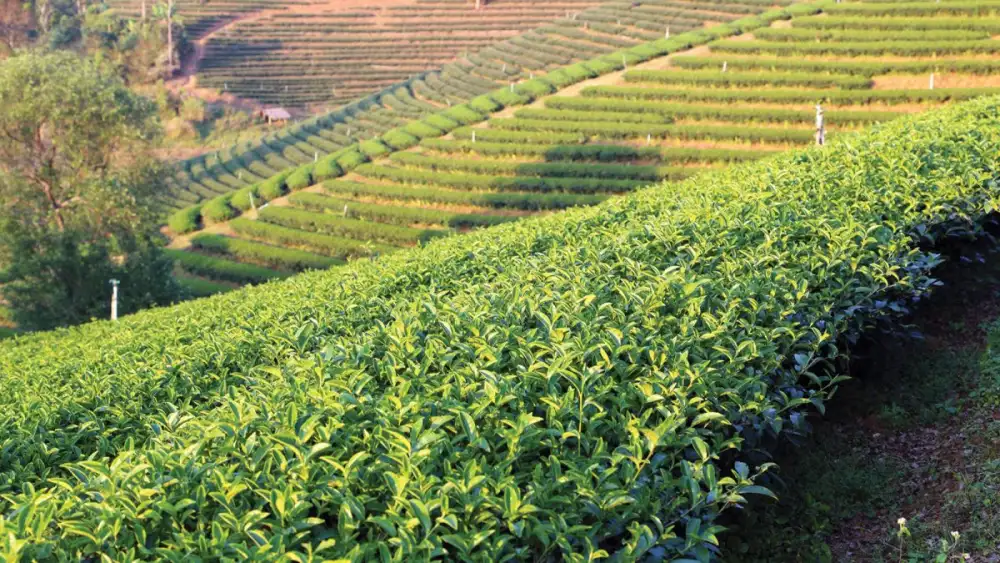
A fresh morning brew is the perfect way to begin the day, and here at the foot of the tall Dan Lao range of mountains of Chiang Rai, mornings are an extra bit special. Guests at Four Seasons Tented Camp Golden Triangle are treated to a special range of high-elevation teas and small plantation arabica coffees that have been carefully selected for their superior qualities. "Waking up to the bird call and jungle views from your tent is exotic," smiles Restaurant Manager Sutas Klangsuwan. "But when you have a range of aromatic teas to match your mood, then the mornings are truly blissful!" The Camp's special selection of in-tent loose tea include oolong osmanthus, chrysanthemum and chamomile - all of which are sourced from independent growers within the region.
Age-Old Tradition
The origins of tea in Chiang Rai and the Chinese inhabitants of Doi Mae Salong is a fascinating story in itself, with many of the villagers tracing their roots to refuge seekers during the Chinese Civil War period. "They made their way into the hills, via Myanmar and Laos," shares Klangsuwan. Bringing their culture of tea-drinking with them, these settlers introduced a variety of oolong and other teas that would suit these distinct climatic conditions of the region. Over decades this culture has evolved to produce some outstanding teas in some especially scenic locales. Not just the weather, the elevation and soil in the Chiang Rai region create typical flavours of both tea and coffee that are hand-picked at the right temperature.
Sustainable Partnerships
At the top of the list is the Oolong Four Seasons from 101 Tea. "This was the very first terraced tea plantation on Doi Mae Salong," shares Klangsuwan. Beginning in 1995, 101 Tea has consistently produced exceptional strains of oolong, such as their award-winning Jin Xuan (Oolong No.12). Set within a historical Chinese village on Doi Mae Salong, 101 Tea is a beautiful drive up into the hilly terrain from the Camp, where guests may visit the village and stop for a fresh cup of tea at the plantation. "The estate has crafted a unique profile of oolong, grown exclusively for the Camp and Four Seasons Resort Chiang Mai for guests to appreciate the delicate flavour," he adds.
Holistic Wellbeing
The chrysanthemum and chamomile teas are sourced from Doi Sa-Ngo, a local village just 7 kilometres (4.3 miles) away from the Golden Triangle. "All three of our teas have unique properties and we encourage our guests to sample them in turn to enjoy the benefits," smiles Klangsuwan. High in antioxidants, known to reduce inflammation and control blood sugar, tea is a great way to cleanse the system. On arrival, the Camp hosts describe the various teas on offer and detail their origins, but for guests looking to experience tea at its source, the Doi Mae Salong Chinese Village and Tea Plantation visit is indeed a must-do. "We recommend that guests steep their own teas every morning and let the floral scents linger a little before taking a first sip," he says.Coffee Break
Similar to tea, here in the cooler clean climes of the Golden Triangle, the Royal Project has identified special terroirs where high-quality Arabica plants produce wonderful flavour profiles with coffees that are unique to the region. "The elevation and mountainous terrain of Chiang Rai enjoys abundant sunshine throughout the year," says Klangsuwan. "The air at the higher altitudes is not as warm, and less humid compared to lower areas. This results in the coffee being less acidic, giving it a more gentle, sophisticated, and smooth flavour." Set up to provide alternative means of income in a region that traditionally produced opium, the Doi Tung Project has been particularly successful in producing very reputable coffees in the Mea Fah Luang district.
"At the Camp we have selected a single plantation coffee bean from Doi Yung, for its superior rich aroma and superior taste," he adds. "A little sweet and fruity on the palate, as we do not blend these coffee beans, but instead roast them in three batches to create li,ght, medium and dark profiles to suit our guests' preferences." The essence of the sun lingers in every cup, just enough to create the perfect balance. "Guests often remark on how delicious the coffee tastes, some even wanting to enjoy it at home" he smiles. Any personal favourites? "I recommend the coffee and tea at Pha Mee village in Mea Sai, where the first coffee plants were grown," he shares.
Celebrating Connection
While the coffee and tea plantations are good to visit year-round, the annual tea event at Doi Mae Salong in December brings together local plantations for a special display of their crop. "During these festivities, tea is prepared using the traditional Boran method and shared with everyone in attendance," he shares. The winter harvest season also calls for a captivating swinging ceremony and celebrations of the various tribes. "The chrysanthemum harvest season in November and December is beautiful too," he adds. "Farmers harvest the flowers early in the morning to have a well-bloom quality." At the same time, the coffee is also picked, providing a good opportunity to witness a local way of life and age-old tradition. Guests and visitors have a unique opportunity to select their own tea leaves, dry them, and personally roll the tea leaves.
"Our Camp is committed to supporting the local communities at every opportunity," comments Klangsuwan. "By partnering with the estates in the region, we are not only able to provide our guests with an authentic experience but also create a meaningful, self-sustaining ecosystem."